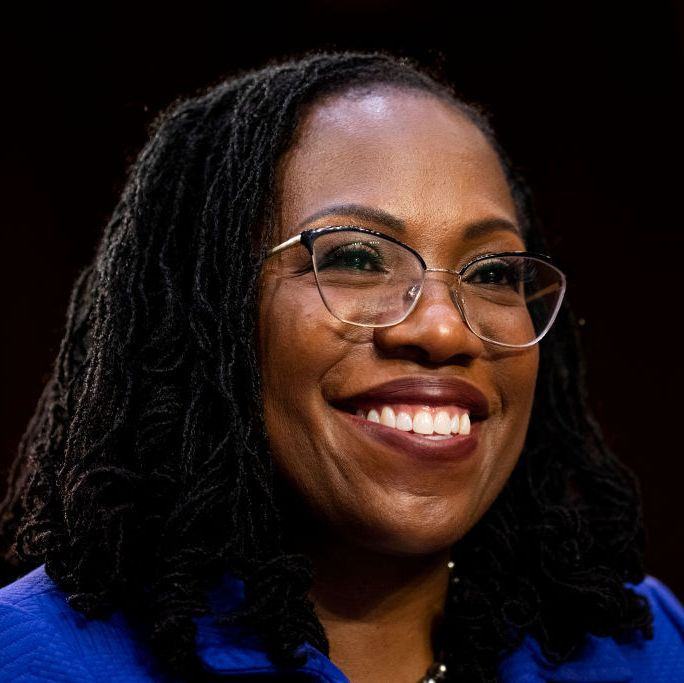Democrats have secured a path to confirm Ketanji Brown Jackson to the U.S. Supreme Court
(Photo credit: Bill Clark, Getty Images)
The confirmation hearings for Supreme Court Justice nominee Ketanji Brown Jackson concluded last Friday after four days of testimony.
As the Senate Judiciary Committee plans to vote on Jackson’s nomination on Apr. 4, it’s becoming abundantly clear that America is about to seat its first Black woman on the Supreme Court.
While the average time between nominations and confirmations for Supreme Court justices has averaged 68 days since the 1970s, Senate Judiciary Chairman Dick Durbin hopes Jackson’s confirmation vote in the Senate will be completed by Apr. 8, just in time for senators to take a spring recess.
The process will likely last longer than the previous justice confirmed to the high court. Amy Coney Barrett was confirmed in a record 27 days after being nominated by Donald Trump six weeks before the 2020 U.S. presidential election.
The Supreme Court that dark money built
Among Jackson’s most ardent supporters was Rhode Island Sen. Sheldon Whitehouse, who noted the nominee has “more experience actually trying cases in your courtroom than any other member of the court.”
Whitehouse used his opening statement to debunk myths of dark money fuelling Jackson’s nomination while recognizing the techniques Republicans are concerned about are the same ones used to put right-wing justices on the Supreme Court.
“The present court is the court that dark money built,” Whitehouse said during the Mar. 21 hearing. “Because of all that secrecy, Americans are denied any real understanding of the overlap of all that dark money with the political dark money funding the Republican Party, which could well explain the wreckage of Senate norms, rules and procedures that accompany the confirmation process of recent nominees.”
Whitehouse is, of course, talking about The Federalist Society, a group that began in the 1980s honoring “The Federalist Papers.” The 1787–88 papers, which were written by right-leaning authors like then-president Alexander Hamilton, sought to influence voters to ratify the U.S. constitution.
While the Federalist Society may sound obscure, six of the nine sitting Supreme Court Justices are current or former members of that club. The Society is so entrenched in the Supreme Court process that members even drafted a list of potential nominees for then-President Trump to nominate. The New York Times reported that as of Mar. 2020, 43 out of 51 of President Trump’s appellate court nominees were current or former members of the society.”
Whitehouse pointed out that the Judicial Crisis Network, a conservative advocacy organization founded by a former law clerk of Justice Clarence Thomas, received a $17 million donation for Justice Neil Gorsuch’s nomination from a single donor.
Whitehouse claimed that the same advocacy group poured in as much as $400 million to thwart Jackson’s nomination. With that much dark money dictating the future of the Supreme Court, it’s hard to trust its legitimacy. Here’s hoping Justice Jackson will help legitimize the highest court in the land.
Explaining Jackson’s judicial methodology
The second day of hearings on Mar. 22 saw Jackson respond to Republican concerns around her “judicial philosophy,” court packing, and claims of being soft on criminals when sentencing cases involving crimes of child pornography.
First, Jackson made clear she has no “judicial philosophy” when it comes to understanding and interpreting the law. Instead, she uses what she calls a three-step “judicial methodology” in each case:
1) Starting from a neutral point of view
2) The ability to receive all relevant case inputs (arguments, briefs, factual record).
3) The application and interpretation of the law to the facts of the case
It’s in that final step of her methodology, Jackson said, “where I’m really observing the constraints on my judicial authority.”
On changing the size of the Supreme Court, Jackson responded that her “North Star is consideration of the proper role of a judge in our constitutional scheme,” arguing that a decision to change the number of justices rests solely with Congress.
As for the claims of leniency for sexual predators, Jackson noted that “nothing could be farther from the truth.”
“The statute doesn't say impose the highest possible penalty for this sickening and egregious crime,” Jackson explained. “The statute says to calculate the guidelines, but also look at various aspects of this offense and impose a sentence that is ‘sufficient but not greater than necessary to promote the purposes of punishment.’”
Retiring Vermont Sen. Patrick Leahy noted that less than two per cent of Jackson’s estimated 573 written opinions have been reversed by higher courts. That’s significant, Leahy said, because the D.C. Circuit reverses an average of 13 per cent of written opinions.
A surprise Republican ‘yes’ vote signals Jackson’s confirmation
While Arizona Sen. Kyrsten Sinema remains the sole holdout from the Democrats to announce her support for Jackson, it appears Democrats have paved a path to Jackson’s confirmation without needing the controversial senator’s vote after all.
In a step from the Republican party line, Maine Sen. Susan Collins revealed on Wednesday that she would vote ‘yes’ on Jackson’s confirmation, securing the 50th and final vote Democrats need to confirm President Biden’s nominee.
"After reviewing Judge Ketanji Brown Jackson's extensive record, watching much of her hearing testimony, and meeting with her twice in person, I have concluded that she possesses the experience, qualifications, and integrity to serve as an Associate Justice on the Supreme Court," Collins said in her statement. "I will, therefore, vote to confirm her to this position."




